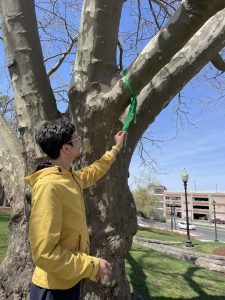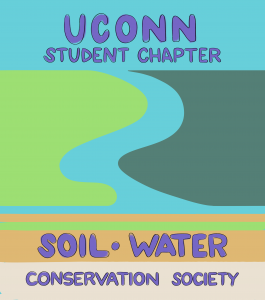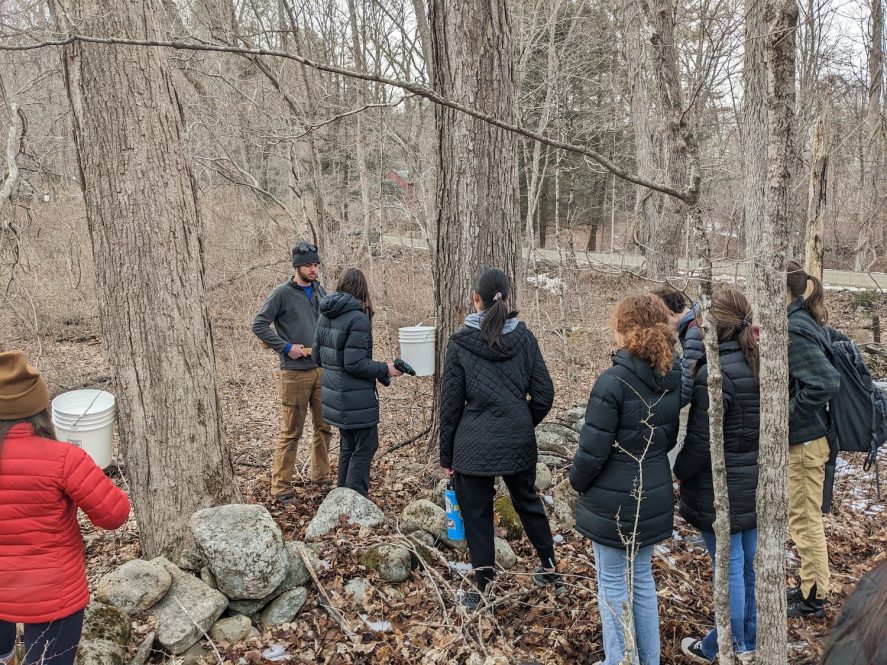College can be an overwhelming time, but it’s important to cut yourself some slack, says Samuel Kocurek (CLAS) ’23.
It’s especially important to find your motivation and community, and fortunately, Kocurek did just that. His experiences not only helped shape his time at UConn, but they helped set him on a trajectory that aligns with his love of nature and a desire to be a leader in the fight to build resilience in the climate crisis.

As one of the most sustainable university campuses in the world — consistently ranking in the top 10 for multiple ranking organizations – UConn relies on dedicated students, staff, and faculty to make this happen. Kocurek is one of UConn’s many students who are deeply involved in shaping sustainability projects. His story shows some of the ways students can get involved and help leave UConn knowing that it’s more sustainable than when they arrived.

Kocurek credits his family for planting the seeds of his love for nature when he was a child. Through gardening and landscaping with his grandmother, mother, and father, he says the outdoors has always been at the core of how he was raised. Growing up, he would spend hours at his grandmother’s garden as she showed him how the garden changed from spring to summer to fall. It gave him context and meaning, and now motivates Kocurek to work in sustainability.
“Those afternoons at my grandma’s were so important to me. It really set in stone from a young age how wonderful nature is,” says Kocurek.
In high school, Kocurek says some of that magic faded as priorities shifted, but it was when he reinvigorated his love of gardening during the pandemic that he really realized how important it was for our physical and mental health that we remain closely connected to nature:
“It was so nice to engage with the land. That’s what really got me back into sustainability — this is where my soul and my heart are.”
Back on campus, post-lockdown, Kocurek started engaging in environmental causes at UConn more fully. He was already living in the EcoHouse Learning Community and became an RA in his sophomore year.
“I remember my mental health took quite a big dip that year and similarly, I found walks in the Hillside Environmental Education Park (HEEP) were helpful. I saw the Office of Sustainability in the Institute of the Environment (OS) was hiring an intern. I applied and got it, and that internship really helped me blossom into the person I am today. Without that internship, I don’t know who I would be.”
The OS revealed even more possibilities, in the variety of projects to get involved in and different ways to approach sustainability, he explains, from engagement and outreach to helping with various certification processes, a whole new world awaited him.
Senior Sustainability Program Manager Patrick McKee says Kocurek has been an incredibly effective student leader for sustainability at UConn, and that he was instrumental in ensuring UConn became re-certified as a Bee Campus USA by the Xerces Society, and as a Tree Campus by the Arbor Day Foundation.
“Those certifications cause us to take a pause and examine what we are doing, what we can work to improve, and I think that they help set good goals and can help create initiatives for other departments and student organizations,” Kocurek says. “I’m proud especially because this was the 10th year we were certified as a Tree Campus and that feels like a significant benchmark that I was able to help UConn achieve.”
Kocurek, with McKee’s encouragement, also trained to become a LEED Green Associate, which he says allowed him to engage with entirely different sectors of sustainability and opened his eyes to different ways the environment and sustainability can work synergistically.
Some of Kocurek’s other projects include: the EcoCaptain program, NatureRX at UConn, serving as treasurer for the EcoGarden Club, re-establishing the Soil and Water Conservation Society UConn Student Chapter, and being named a UConn@COP fellow and traveling to COP 27 in Sharm el-Sheik, Egypt.
In his time working in the OS, Kocurek says the opportunity to collaborate with other people at the university has been incredibly rewarding, helping him to learn how to be professional as well as building on his knowledge about sustainability within a broader organization.

“I worked with a couple of interns to do the greenhouse gas inventory to see the emissions from the university, the drivers of climate change, and to see the trends and how to reach out to all these different departments and learn about initiatives that are happening across, facilities, operations that come out of agricultural farms, and the animal farms on campus,” he says.
“I remember when I was at COP 27, I went to a panel presentation about the Gap Emissions Report based on the 2015 Paris Climate Agreement and it was amazing to see something that I do at UConn, which is a relatively small-scale, applied at a larger level. It indicated that this experience with the OS grew me into someone who can effectively contribute to the mitigation and adaptation to the climate crisis.”
Kocurek feels that his experiences, especially those at COP27, have provided context as to how sustainability functions in the world. After graduation, he will be attending University of Michigan to pursue a master’s in sustainability and development, and he is excited to see where he can fit in to help within his new setting.
“I think moving to a new space and learning about how students engage, and how I can engage will be interesting. This work has been so important to me, and it’s so close to my values as to how I’ve developed my own relationship with the land. Back in February, I was one of the TEDx speakers and I spoke about mental health in nature I highlighted NatureRx, because being with plants and the environment and being intentional with it is so good for us. Climate change is here, it’s happening now, but there are a lot of outlets for how we can work to adapt to it and mitigate its impacts. Being present with the land, regardless of how it is changing, is so good for us.”
If you are interested in getting involved in sustainability efforts around campus, including how to apply for a UConn@COP28 fellowship, contact the UConn Office of Sustainability or visit the their website for more details on how to apply.



